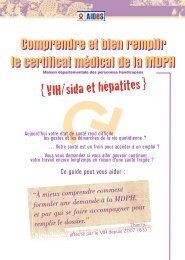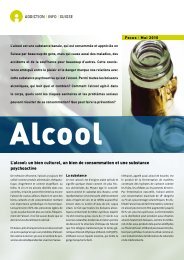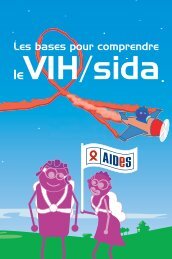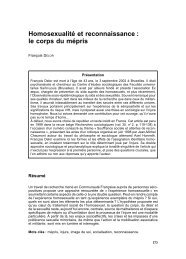Care and support for people living with HIV/AIDS
Care and support for people living with HIV/AIDS
Care and support for people living with HIV/AIDS
You also want an ePaper? Increase the reach of your titles
YUMPU automatically turns print PDFs into web optimized ePapers that Google loves.
Report on the global <strong>HIV</strong>/<strong>AIDS</strong> epidemic – June 2000Not surprisingly, the great majority of individuals who suspect or know they areinfected do not wish to disclose their status publicly. In the absence of <strong>support</strong> <strong>for</strong>sharing the news, most <strong>people</strong> shrink from telling their spouse or partner that theyhave <strong>HIV</strong>. Families protect their loved ones from disclosure during <strong>and</strong> even after illness<strong>and</strong> death, <strong>and</strong> those who care <strong>for</strong> them often collude in the denial. In a city inSouth Africa <strong>with</strong> a high prevalence of <strong>HIV</strong> infection, one hospital runs a training programme<strong>for</strong> providers of home-based care <strong>for</strong> the dying in which the word “<strong>AIDS</strong>” isnever mentioned.It takes no great leap of the imagination to see that, <strong>for</strong> individuals, this wall ofsilence hinders both prevention <strong>and</strong> care. If <strong>people</strong> are so afraid to acknowledge oreven find out that they are infected, they will lose precious opportunities <strong>for</strong> wardingoff or treating illnesses brought on by the infection (see pages 105-106). If couplescannot talk about risks that either one may have taken, it is hard <strong>for</strong> either partner tobring up the issue of condoms or <strong>HIV</strong> testing as a way of preventing further spreadof the virus to the spouse or child.The stigma surrounding <strong>AIDS</strong> can extend into the next generation, placing a furtheremotional burden on the shoulders of orphans <strong>and</strong> other survivors. When childrenwhose parents had died of <strong>AIDS</strong> in the hard-hit rural community of Rusinga Isl<strong>and</strong>,Kenya, were asked about the cause of their parent’s death, the single most commonresponse was witchcraft or a curse. Often, they gave detailed explanations of thenature of the curse. None mentioned <strong>AIDS</strong>.This reluctance to recognize the cause of death was not the result of ignoranceabout <strong>AIDS</strong>. As Figure 13 shows, knowledge about <strong>AIDS</strong> was more or less universalamong these children. Many were also prepared to recognize that <strong>AIDS</strong> had killedmany <strong>people</strong> in their community. The closer the questioning came to home, however,the less the willingness to acknowledge the personal impact of the disease. Not oneof the 72 <strong>AIDS</strong> orphans in the study said that their parents had died of <strong>AIDS</strong>.Unin<strong>for</strong>med <strong>and</strong> hence vulnerableIn the last decade, extraordinary strides have been made in imparting to <strong>people</strong> thebasic facts about <strong>HIV</strong>: how it is transmitted <strong>and</strong> how it can be prevented.Remarkably high proportions of <strong>people</strong> of all ages in most continents know about<strong>HIV</strong> <strong>and</strong> <strong>AIDS</strong>, <strong>and</strong> most can repeat the basic facts about the transmission <strong>and</strong> preventionof <strong>HIV</strong> infection.Despite generally high levels of basic knowledge, however, millions of <strong>people</strong> aroundthe world are still vulnerable to <strong>HIV</strong> because they do not know the basic facts.Pockets of ignorance <strong>and</strong> misin<strong>for</strong>mation survive even in the worst-affected populations.In the South African town of Carletonville, <strong>for</strong> example, only 40% of men orwomen knew that an individual can live <strong>with</strong> the virus <strong>for</strong> many years <strong>with</strong>out any40











